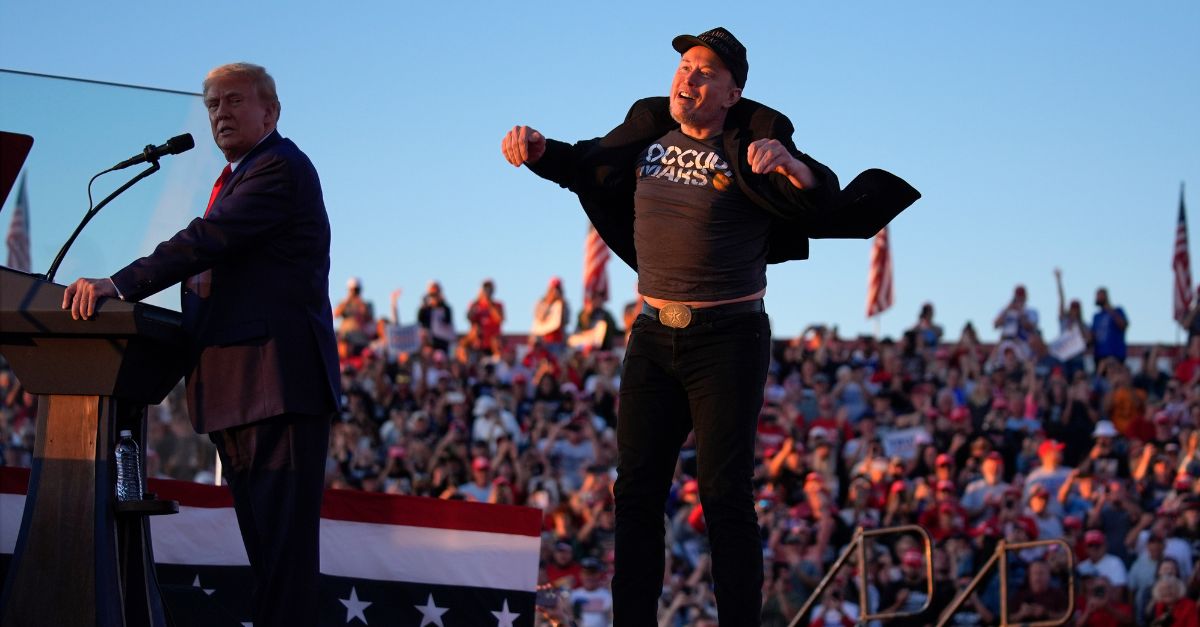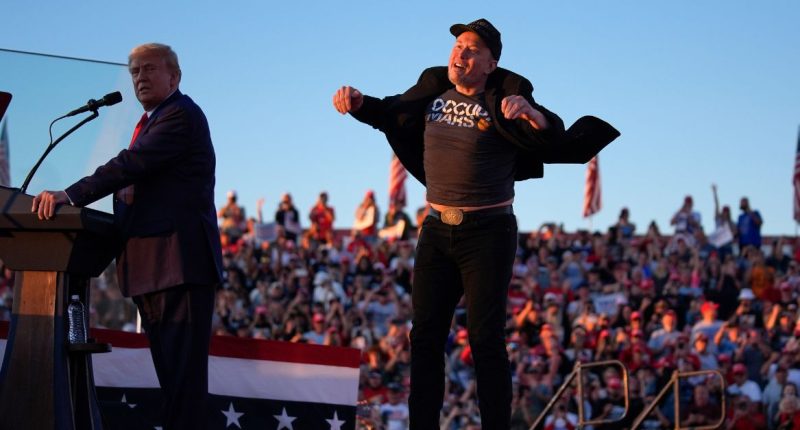
Elon Musk jumps on the stage as Republican presidential nominee former President Donald Trump speaks at a campaign rally at the Butler Farm Show, Saturday, Oct. 5, 2024, in Butler, Pa. (AP Photo/Evan Vucci)
A Maryland federal judge late Thursday continued to block Elon Musk and his Department of Government Efficiency (DOGE) from accessing Americans’ personally identifying information stored by the Social Security Administration (SSA).
In a 148-page memorandum opinion, U.S. District Judge Ellen Hollander, a Barack Obama appointee, harshly appraised a sea change in privacy protections since DOGE began what its leaders describe as budget-cutting work for the Trump administration.
“The Social Security Administration was established in 1935,” the judge’s opinion begins. “Almost from its inception, it has collected, stored, respected, and protected the private, personal, and confidential information of the American people. Indeed, ensuring confidentiality of personal records has been a bedrock principle of the agency. In recent months, however, the Social Security Administration has abruptly changed course.”
The gargantuan order offers a small reprieve for the government; the defendants are given permission “to submit a motion for stay, at their convenience,” while giving the plaintiffs 48 hours to respond.
The district court previously issued a temporary restraining order barring DOGE from accessing non-anonymized personal data as well as demanding they “disgorge and delete” any personally identifying data in their possession and remove any software or code the Musk-led group may have installed or altered on SSA computer systems.
The government appealed the restraining order to the 4th U.S. Circuit Court of Appeals but was rejected. The plaintiffs then moved for a preliminary injunction to maintain the privacy controls.
Now, those controls will remain in place while the rest of the lawsuit plays out at the district court level. The government will, however, be able continue providing DOGE with access to anonymous data provided the staffers in question “have completed training and background checks comparable to that which is typically required for SSA employees with such access,” the ruling says.
In granting the injunction, the judge suggested the overarching goals expressed by Musk and DOGE are, at least generally, worthwhile.
“The objective to address fraud, waste, mismanagement, and bloat is laudable, and one that the American public presumably applauds and supports,” Hollander writes. “Indeed, the taxpayers have every right to expect their government to make sure that their hard earned money is not squandered.”
Rather, the court says, the issue is how DOGE wants to perform its work — and how the SSA is willing to abandon its long-standing mission.
“However, the issue here is not the work that DOGE or the [Social Security Administration] want to do,” the order continues. “The issue is about how they want to do the work. For some 90 years, SSA has been guided by the foundational principle of an expectation of privacy with respect to its records,” the opinion continues. “This case exposes a wide fissure in the foundation.”
The underlying lawsuit accuses the government of violating the Privacy Act and the Administrative Procedure Act. The judge, for her part, believes the plaintiffs are likely to prove those allegations.
From the ruling, at length:
Logically, “[t]here is generally no public interest in the perpetuation of unlawful agency action.” On the other hand, there is a substantial public interest “in having governmental agencies abide by the federal laws that govern their existence and operations.” …
[T]here is a strong public interest in maintaining the confidentiality of PII, such as medical records and financial information. Indeed, society expects as much. Defendants admit that the SSA granted DOGE personnel broad access to the PII of millions of Americans. This intrusion into the personal affairs of millions of Americans — absent an adequate explanation for the need to do so — is not in the public interest. This is especially true because SSA has long communicated to the public its commitment to privacy.
The court also puts the issue of privacy squarely in personal terms — turning it back on DOGE in a goose-gander criticism against the government.
“The government has concealed the identity of [DOGE’s SSA team] because of concern that the disclosure of their names would expose the individuals to harassment and thus invade their privacy,” a footnote early on in the decision notes. The judge returns to this later.
Love true crime? Sign up for our newsletter, The Law&Crime Docket, to get the latest real-life crime stories delivered right to your inbox.
The plaintiffs in the case, a group of two labor unions and one retiree association, have excoriated Musk and DOGE for trying to access millions of Americans’ personal data while refusing to reveal the identities of DOGE staffers over concerns “that the disclosure of even their names would expose them to harassment and thus invade their privacy.”
“However, DOGE does not appear to share a privacy concern for the millions of people whose SSA records were made available to its affiliates without their consent,” the plaintiffs said in a press release hailing the court’s decision.
The opinion acridly takes stock of this dynamic.
“Defendants clearly understand why guarding privacy, rather than waiting for harm to occur, is important,” Hollander goes on — near the end of the opinion. “After all, that is precisely the reason why they have withheld the names of most of the members of the SSA DOGE Team. But, defendants have not shown the same level of care with the far more sensitive, confidential data of millions of Americans who entrusted their government with their personal and private information. The trust appears to have been violated.”





